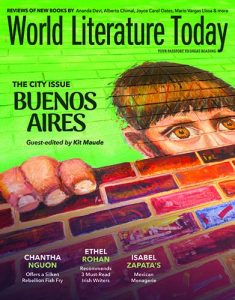Black Warrior Review – Fall/Winter 2011
Volume 38 Number 1
Fall/Winter 2011
Biannual
Kevin Larsen
After thumbing through, then devouring, the 2011 Fall/Winter issue of Black Warrior Review, I’m convinced that this publication is one I need to keep my eye on. Reading work from nearly thirty different writers and poets has simply impressed me with not only the quantity but also the quality, the originality, and the freshness of the prose and poetry in this magazine.
After thumbing through, then devouring, the 2011 Fall/Winter issue of Black Warrior Review, I’m convinced that this publication is one I need to keep my eye on. Reading work from nearly thirty different writers and poets has simply impressed me with not only the quantity but also the quality, the originality, and the freshness of the prose and poetry in this magazine.
This issue has three sections. The first section contains a mix of poetry, fiction, nonfiction, and even a couple of comic strips; the second section is the feature section, a cohesive collection of writing centered on the theme, “Interruption”; and the third section is a chapbook from poet Joyelle McSweeney.
The opening story, “[the fifth house]” by J.A. Tyler, sets a somewhat somber mood for the entire magazine. I thought it was an interesting choice to be placed at the beginning, but ultimately a smart one. Tyler’s story definitely comes from an experimental vein, favoring descriptive tones and a powerful voice rather than narrative detail, aspects that help showcase the other pieces in this issue. “[the fifth house]” is an odd story—third sentence: “I was a deer again, as my brother and I had been when we were young, when we had antlers, when we lowered our necks”—but it is also evocative with powerful images and rhythmic prose.
The remainder of the first section, a decent seventy pages or so, is a captivating read. In a nonfiction piece, “Operation Toe Breaker,” Brandon Davis Jennings channels Tim O’Brien, referencing and clearly paying homage to The Things They Carried. Jennings tells his own war story, pointing out that “Real war stories aren’t about excitement and adventure; they’re about facts. Shitty, blood-caked facts.”
In another piece involving war, this one a short story titled “Love is Such an Old-fashioned Word,” Blair Bourassa writes about two linguists and their indirect attempts to define their love for each other while war in Europe erupts around them. “Love Letter 32,” a poem by Esvie Coemish, subtitled “Snapshots from the Honeymoon of Our Long Germination,” rounds out the first section with contemplations of evolution and love.
The real star here is the feature section, “Interruption.” In a letter to the readers, the editors explain the theme as “a moment of un-being—an arrest or hindrance of the continuity or uniformity of act, thought, writing, conversation or other discourse.” Despite the discontinuous nature of the theme, the feature really is best referenced as a whole, as each of the twenty-odd pieces resonate together to create a sense of abruptness.
“Interruption,” and really the entire issue, can be summarized best by the editors’ words: a “liminal space between thought, word and utterance, [where] we felt writers and readers would be encouraged to reformulate, reconceive and reorient in thought and speech to the world, each other and as selves.”
[www.bwr.ua.edu]



